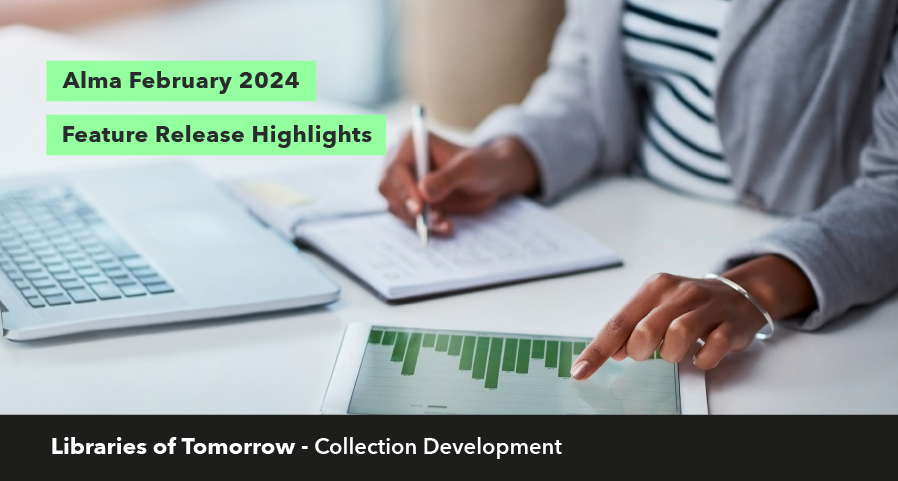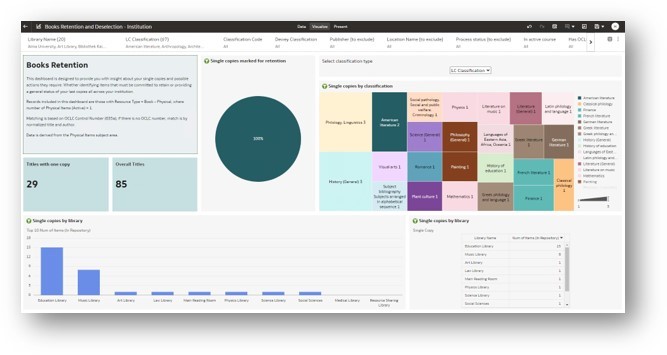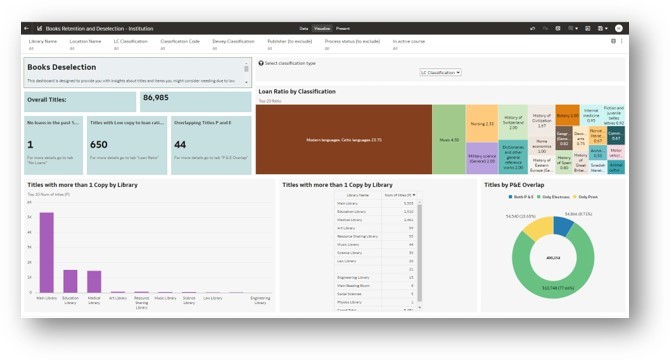February 2024 Feature Release Highlights

Our February 2024 Feature Release showcases a new look for the Alma login screen, and a new login theme for the year - Libraries of Tomorrow. The theme for the February Feature release is Collection Development. Collection Development will be an important element in the Alma Road Map for 2024 and beyond.
You can read about the first analytics dashboard that gives an insight into retention and deselection decisions below.

“Books: Retention & Deselection - Institutional Level” Insight Dashboards
New out-of-the-box Data Visualization workbooks have been released and are available in the out-of-the-box object list. These dynamic dashboards are specifically crafted to address various queries that institutions might encounter when making decisions regarding Retention and Deselection. The dashboards provide insightful visuals and answers to questions such as:
- Determining which library holds the highest number of single copies.
- Highlighting titles marked for retention.
- Identifying titles with a low copy-to-loan ratio.
- Analyzing P & E overlap
...and more.
It is possible to set these dashboards as an optional home page in Alma using the new “Add as Homepage Dashboard” feature. Whether you are seeking information on single copies, retention decisions, and any other institutional level collection analysis, these new workbooks will provide a comprehensive and visually engaging tool for effective decision-making in library management.
 Libraries are able to more easily manage their collections and identify potential retention and deselection opportunities.
Libraries are able to more easily manage their collections and identify potential retention and deselection opportunities.
Books Retention dashboard

Books Deselection Dashboard


New Layout for PO Line Task Lists will be the Exclusive Option
With the February 2024 Feature Release the PO line transitions to its final phase and is now the only interface for all users. The classic interface has been officially "Sunset".
For a general overview of the new PO Lines task list, see the New Unified PO Line Task List. See also Searching for PO Lines - New Layout; Managing PO Lines - New Layout.
For more information see also the New Unified PO Line Task List in the Alma 2023 Roadmap Webinar Series
 Users now have a more streamlined experience, more information available upfront, new search and facet options and many more advantages.
Users now have a more streamlined experience, more information available upfront, new search and facet options and many more advantages.
 Idea Exchange - Ability to bulk delete harvested SUSHI COUNTER reports
Idea Exchange - Ability to bulk delete harvested SUSHI COUNTER reports
In order to improve the efficiency of users managing SUSHI harvested COUNTER report, an option has been added to pages that allows users to select more than one file from the list of the downloaded report to bulk delete these files. In addition, a “select all” and "Delete all" option has been added.
 Customers are now able to manage their lists of downloaded SUSHI COUNTER files more efficiently by running bulk delete actions.
Customers are now able to manage their lists of downloaded SUSHI COUNTER files more efficiently by running bulk delete actions.
Upload Electronic Holdings
Automatic Upload of Electronic Holdings allows libraries to update their holdings in the Taylor and Francis journal collection. Once enabled, the process automatically downloads a KBART formatted holdings file from the Taylor & Francis platform, uploads the file and updates your holdings in the Taylor and Francis collection.
 Automated upload of electronic holdings for Taylor & Francis journals will save staff time and manual labor, improving accuracy and efficiency.
Automated upload of electronic holdings for Taylor & Francis journals will save staff time and manual labor, improving accuracy and efficiency.
 Idea Exchange - Configurable physical item conditions
Idea Exchange - Configurable physical item conditions
Libraries are now able to configure the list of physical conditions that can be selected to describe the item in the physical item condition field.
 This is useful for libraries that require a more varied list of terms to describe their items' physical condition.
This is useful for libraries that require a more varied list of terms to describe their items' physical condition.
 Idea Exchange - Linked Open Data enrichment for IdRef authorities
Idea Exchange - Linked Open Data enrichment for IdRef authorities
The Linked Data enrichment process for bibliographic records that are linked to IdRef authorities now also generates URIs to the IdRef authority records, so that libraries that work with IdRef authorities can benefit from their Linked Open Data capabilities.
 This is especially useful for institutions that work with IdRef authorities and would like to add URIs when publishing the records or see the URI as part of the linked data action in the All Titles search.
This is especially useful for institutions that work with IdRef authorities and would like to add URIs when publishing the records or see the URI as part of the linked data action in the All Titles search.
Filtering Holdings Sets Using Indication Rules
It is now possible to filter sets of holdings records using indication rules when saving a holdings search or using the "Filter Set" option in the Manage Sets page.
Creating indication rules using a form now also supports rules based on holdings records' metadata, to create form-based indication rules for holdings records, in addition to bibliographic and authority records.
 This is particularly useful for libraries that want to filter their holdings sets by metadata that is not available as part of the search indexes.
This is particularly useful for libraries that want to filter their holdings sets by metadata that is not available as part of the search indexes.
Overlap Analysis report will include Link Resolver usage data
The "Analysis information" tab in the excel report generated from the overlap analysis has been enhanced to present the usage range (past 12 months).
Electronic Portfolios which are part of the report now have dedicated columns to present the portfolio's link resolver usage. This information is identical to the information in Alma analytics and from the Alma UI.
 This information will help staff understand the value of the portfolio - based on its usage.
This information will help staff understand the value of the portfolio - based on its usage.
 Convert Itemized Collections to Logical Collections (and vice versa)
Convert Itemized Collections to Logical Collections (and vice versa)
It is now possible to convert existing Collections to a Logical Collection and vice versa. This lets institutions easily migrate their existing repository to a logical-based hierarchy without duplicating collections.
 This will save time and duplicate collections when starting to implement logical collections.
This will save time and duplicate collections when starting to implement logical collections.
 Idea Exchange - Deliver ePub via the Alma Viewer
Idea Exchange - Deliver ePub via the Alma Viewer
The Alma Viewer now displays ePub files to end users with an intuitive and accessible embedded 3rd party viewer.
 The range of content deliverable via out of box viewers in Alma Digital has been expanded.
The range of content deliverable via out of box viewers in Alma Digital has been expanded.
Support for OAI-PMH harvest of MODS repositories
In addition to the existing MARC and Dublin Core, It is now possible to harvest remote MODS repositories into Alma, supporting the creation and update of records in Alma with a remote representation. As part of the import profile, users will be able to configure matching methods, normalizations and more.
 This expands the range of repositories that can be integrated with Alma.
This expands the range of repositories that can be integrated with Alma.

Support for visiting patrons functionality using the Inn-Reach D2IR API
It is possible to integrate Alma with Inn-Reach using version 3 of the D2IR API. When using this version of the API, Alma and Inn-Reach can be used in an integrated manner for supporting the Visiting Patrons workflow, in addition to the classic resource sharing requesting workflow.
 This enables the use of Alma and Inn-Reach in an integrated manner for supporting the Visiting Patrons workflow in addition to the classic resource sharing requesting workflow.
This enables the use of Alma and Inn-Reach in an integrated manner for supporting the Visiting Patrons workflow in addition to the classic resource sharing requesting workflow.
Conditional digital document delivery
Lenders that provide a document delivery service are now able to indicate whether the supplied document may be made available to the patron in digital form, or whether the digital content will require manual handling by the borrower staff. For example, printing a physical copy that can be shared with the patron as a non-returnable item.
 This new option enhances copyright control, by enabling lender libraries to indicate to the borrower libraries the terms and conditions by which the digital content may be shared with the requesting patrons.
This new option enhances copyright control, by enabling lender libraries to indicate to the borrower libraries the terms and conditions by which the digital content may be shared with the requesting patrons.
Previous temporary locations in resource sharing requests
Alma now correctly handles the check in of items in temporary locations that were shipped for fulfilling a lending resource sharing request. When checked back in, the item will be restored to the temporary location where it was previously shelved.
 This allows libraries to ship items or fulfil resource sharing requests even if they are shelved at temporary locations, and enable them to be reshelved to the temporary locations when checked back in.
This allows libraries to ship items or fulfil resource sharing requests even if they are shelved at temporary locations, and enable them to be reshelved to the temporary locations when checked back in.

Hotkeys and responsiveness to voice dictation software
Librarians can now select from the top right icons using hotkeys or use voice dictation software to reduce the amount of mousing.
 This makes Alma more accessible.
This makes Alma more accessible.


